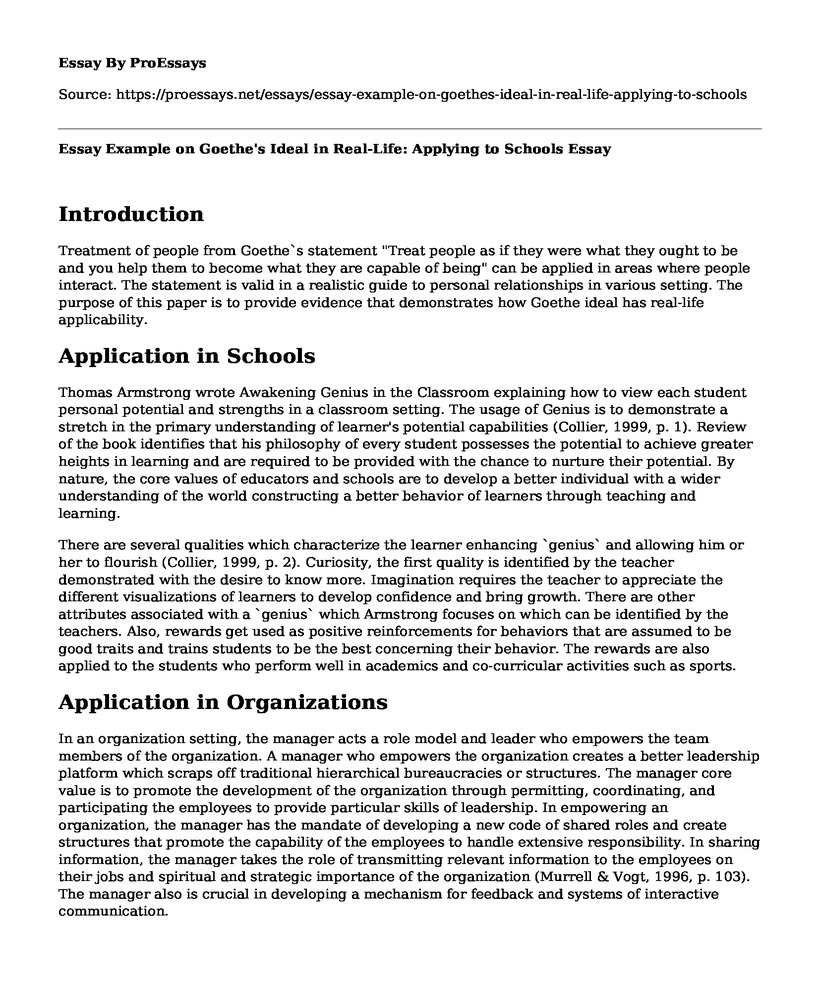Introduction
Treatment of people from Goethe`s statement "Treat people as if they were what they ought to be and you help them to become what they are capable of being" can be applied in areas where people interact. The statement is valid in a realistic guide to personal relationships in various setting. The purpose of this paper is to provide evidence that demonstrates how Goethe ideal has real-life applicability.
Application in Schools
Thomas Armstrong wrote Awakening Genius in the Classroom explaining how to view each student personal potential and strengths in a classroom setting. The usage of Genius is to demonstrate a stretch in the primary understanding of learner's potential capabilities (Collier, 1999, p. 1). Review of the book identifies that his philosophy of every student possesses the potential to achieve greater heights in learning and are required to be provided with the chance to nurture their potential. By nature, the core values of educators and schools are to develop a better individual with a wider understanding of the world constructing a better behavior of learners through teaching and learning.
There are several qualities which characterize the learner enhancing `genius` and allowing him or her to flourish (Collier, 1999, p. 2). Curiosity, the first quality is identified by the teacher demonstrated with the desire to know more. Imagination requires the teacher to appreciate the different visualizations of learners to develop confidence and bring growth. There are other attributes associated with a `genius` which Armstrong focuses on which can be identified by the teachers. Also, rewards get used as positive reinforcements for behaviors that are assumed to be good traits and trains students to be the best concerning their behavior. The rewards are also applied to the students who perform well in academics and co-curricular activities such as sports.
Application in Organizations
In an organization setting, the manager acts a role model and leader who empowers the team members of the organization. A manager who empowers the organization creates a better leadership platform which scraps off traditional hierarchical bureaucracies or structures. The manager core value is to promote the development of the organization through permitting, coordinating, and participating the employees to provide particular skills of leadership. In empowering an organization, the manager has the mandate of developing a new code of shared roles and create structures that promote the capability of the employees to handle extensive responsibility. In sharing information, the manager takes the role of transmitting relevant information to the employees on their jobs and spiritual and strategic importance of the organization (Murrell & Vogt, 1996, p. 103). The manager also is crucial in developing a mechanism for feedback and systems of interactive communication.
In matters related to decision making, the empowering manager develops the foundation earlier and shares the responsibility for making decisions with employees that are associated with the decisions. In the evaluation process, the manager focuses on the specific talents of employees that identify effective use of opportunities. Also, self-diagnosis applies in evaluation where they provide encouragement and support responding to the request of the employee. In motivation, the manager enables the team members to be conversant with their own goals facilitating the participation in and structuring them with their motivators (Murrell & Vogt, 1996, p. 105). These responsibilities of the manager develop a better relationship and more power between the employee and the manager contributing to the organization performance. In the growth of the organization, how the manager treats the employees goes a long way in ensuring the organization develops.
References
Collier, J. (1999). Awakening Genius in the Classroom by Thomas Armstrong. Electronic Journal for Inclusive Education, 1(2).
Murrell, K. L., & Vogt, J. F. (1996). THE MANAGER AS LEADER IN AN EMPOWERING ORGANIZATION: OPPORTUNITIES AND CHALLENGES (2nd ed.). The Pfeiffer Library.
Cite this page
Essay Example on Goethe's Ideal in Real-Life: Applying to Schools. (2023, Apr 09). Retrieved from https://proessays.net/essays/essay-example-on-goethes-ideal-in-real-life-applying-to-schools
If you are the original author of this essay and no longer wish to have it published on the ProEssays website, please click below to request its removal:
- Literary Analyis Essay on Social Class and Status in The Great Gatsby
- Why Is Montresor an Effective Villain: The Cask of Amontillado Essay
- Fences' Cory Essay
- Nurse's First Week: A Frustrating Stroke Patient - Essay Sample
- Article Analysis Essay on Ethics of Literacy Research in the 21st Century
- Essay Example on Observing Year One Children: Assessing Learning Style & Strengths
- Mental Book Review: "An Unquiet Mind" - Free Paper Sample







